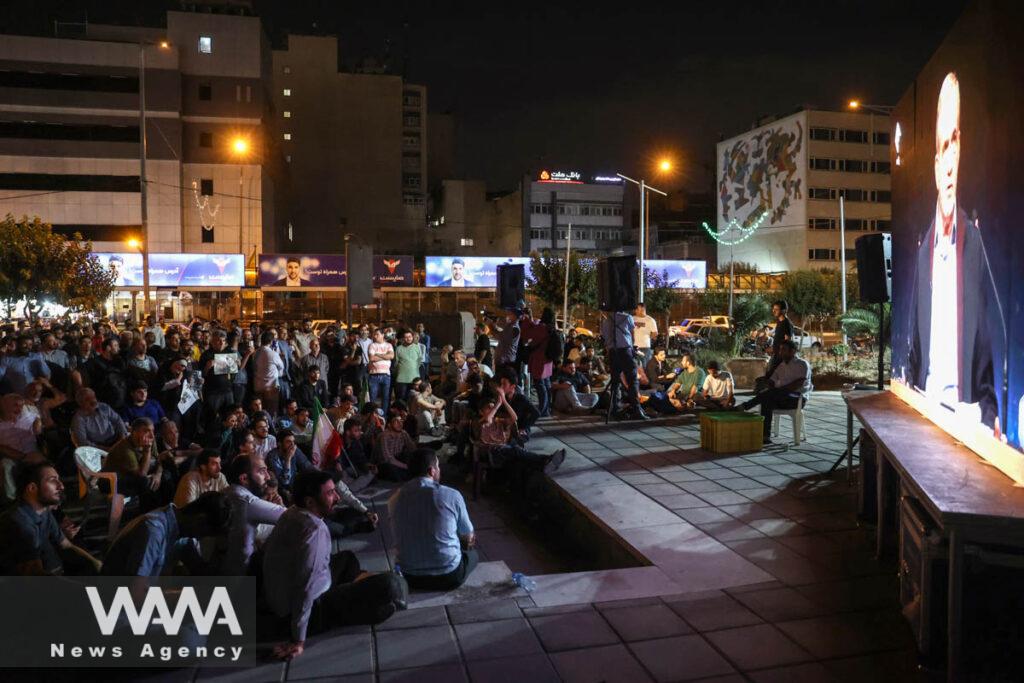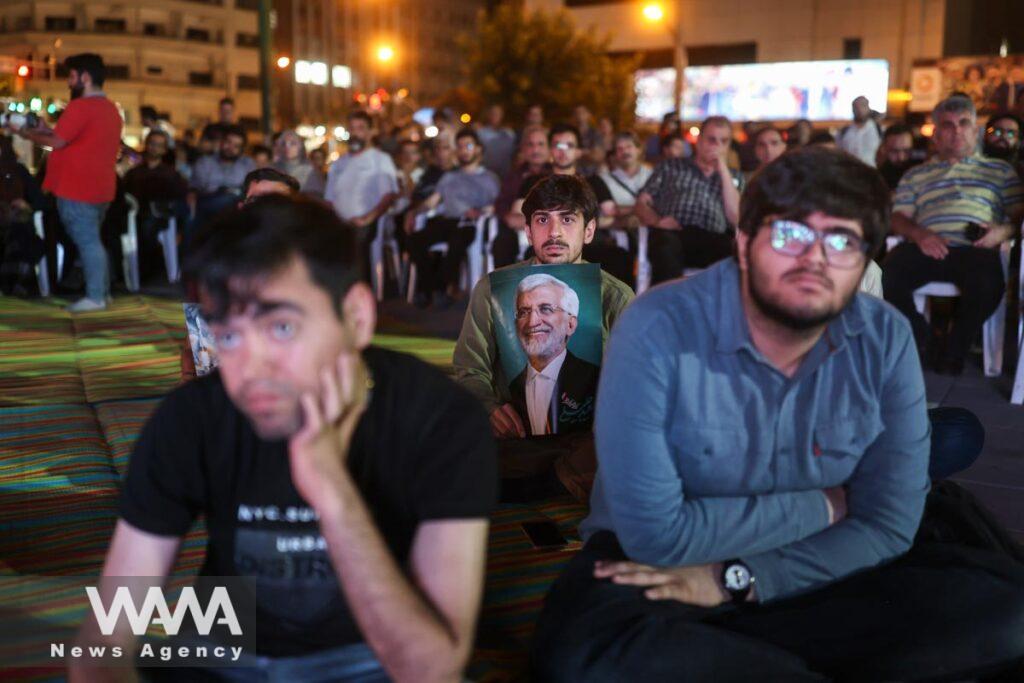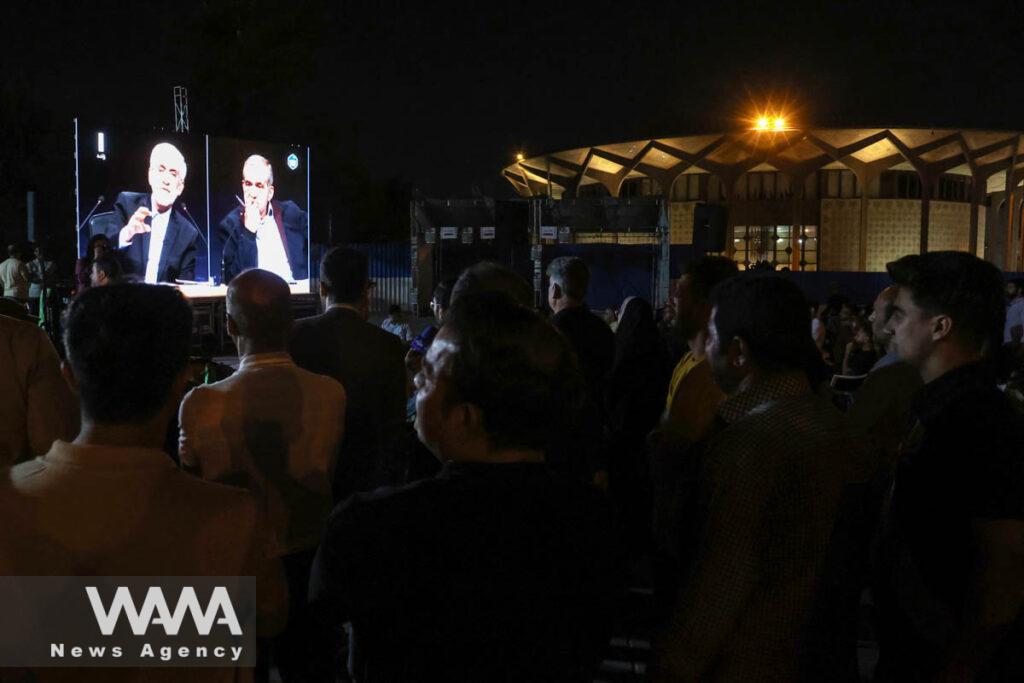The Last Debate, The Most Serious Election Discussion
WANA (July 3) – The second election debate began differently. Masoud Pezeshkian, who had launched his campaign emphasizing the continuation of the late Raisi’s government, revealed a new persona last night and described Raisi’s administration as weak.
Pezeshkian’s strategy has significantly changed as election day approaches. He used non-standard political language and occasionally offensive rhetoric. Perhaps his advisors told him that he must attack his opponent to mobilize the silent vote.
Many of Pezeshkian’s close associates confirm his nervous personality and can easily be provoked by any argument. During this short period, Pezeshkian’s team worked hard to address this weakness and help him stay calm during debates.
In the previous five debates, his team’s efforts paid off as Pezeshkian tried to portray a quiet demeanour. However, his anger and aggressiveness became somewhat evident in the last two debates.

People watch the debate of presidential candidates at a park in Tehran, Iran, July 1, 2024. Majid Asgaripour/WANA (West Asia News Agency) via REUTERS ATTENTION EDITORS – THIS PICTURE WAS PROVIDED BY A THIRD PARTY
Jalili, the candidate representing the conservatives, also entered the last two debates more boldly and showed that he could deliver fiery speeches and firmly defend his views and plans, contrary to his usual calm appearance.
In the last two debates, Pezeshkian focused on challenging Jalili’s plans rather than presenting his ideas. Many believe that Pezeshkian is the least prepared presidential candidate in the history of Iran’s presidential elections, having yet to offer specific programs or solutions for the many existing problems in Iran.
Pezeshkian’s reformist advisors advised attacking and undermining his rivals’ plans and proposals. When Jalili repeatedly asked him to present his plan for managing the country in the last debate, Pezeshkian dodged the question by questioning Jalili’s plans instead.
Pezeshkian’s campaign strategy is based on fearmongering against Jalili. He addresses the public and warns them about the future consequences if Jalili becomes president, particularly on issues like sanctions, oil, nuclear matters, and foreign trade. His advisors more explicitly implement this electoral strategy in non-televised advertisements.
Jalili, however, came to the debate studio much differently than on the first night. He tried to distance himself from his usual expert opinions and challenge Pezeshkian. The major criticism from Jalili’s supporters is that he speaks very academically, while his reformist rival speaks more colloquially with the people.

People watch the debate of presidential candidates at a park in Tehran, Iran, June 17, 2024. Majid Asgaripour/WANA (West Asia News Agency)
Jalili’s speeches heavily featured statistics and numbers. In contrast, Pezeshkian did not engage in discussions based on statistics and scientific findings in any of the debates. Instead, he often highlighted problems and shortcomings, attempting to conceal his weakness.
Pezeshkian did not satisfactorily answer the crucial question about gasoline prices. He initially confirmed his previous statement about raising gasoline prices to 25,000 tomans (about 41 cents) in a student gathering. Still, in last night’s debate, he said he wouldn’t act like he did in the student session if elected. However, he did not specify what exact price he would set for fuel in his potential administration or what solution he has for the high fuel consumption in the country.
Pezeshkian’s frequent reference to experts’ opinions can be somewhat effective. Still, beyond a certain point, it becomes clear that someone aspiring to be president is not fully aware of many issues and problems in the country.

Jalili vs. Pezeshkian: Respectful Clash, Heated Debate
WANA (July 02) – The recent debate between Saeed Jalili and Masoud Pezeshkian on June 21, 2024, stood out as one of the most unique electoral debates in recent years. Due to fewer participants, the atmosphere was more intimate and dynamic, transforming the debate into a genuine and meaningful discussion. Differences from Previous Debates […]
Compared to former President Hassan Rouhani, Pezeshkian is not adept with numbers. Throughout the six debates, he did not mention any specific figures regarding Iran’s economy and did not present a clear viewpoint on economic challenges.
The debates have concluded, and Friday, July 5, is election day in Iran. Both sides consider themselves winners of the debates. On social media, the candidate’s supporters are boasting about each other.
The candidates are worried about low voter turnout. Campaigns have not yet succeeded in convincing silent or undecided voters to participate in the election. Neither the reformists’ nor the conservatives’ campaigns have managed to improve voter turnout.
It seems that the public’s level of concern and disappointment with their leaders’ performance exceeds the Iranian rulers’ expectations.
By: Mehdi Arabi

Following in the footsteps of Rouhani, Iran presidential election
WANA (June 24) – Iranian social media has gone viral with a picture of Former Iranian president Hassan Rouhani tying a necktie for Reformist candidate Masoud Pezeshkian. This resembles the idea that the Pezeshkian administration will be “Rouhani’s third term.” Pezeshkian says, “I’m not the third Rouhani government,” his fellow Reformists try their best […]

People watch the debate of presidential candidates at a park in Tehran, Iran, July 1, 2024. Majid Asgaripour/WANA (West Asia News Agency) via REUTERS ATTENTION EDITORS – THIS PICTURE WAS PROVIDED BY A THIRD PARTY












